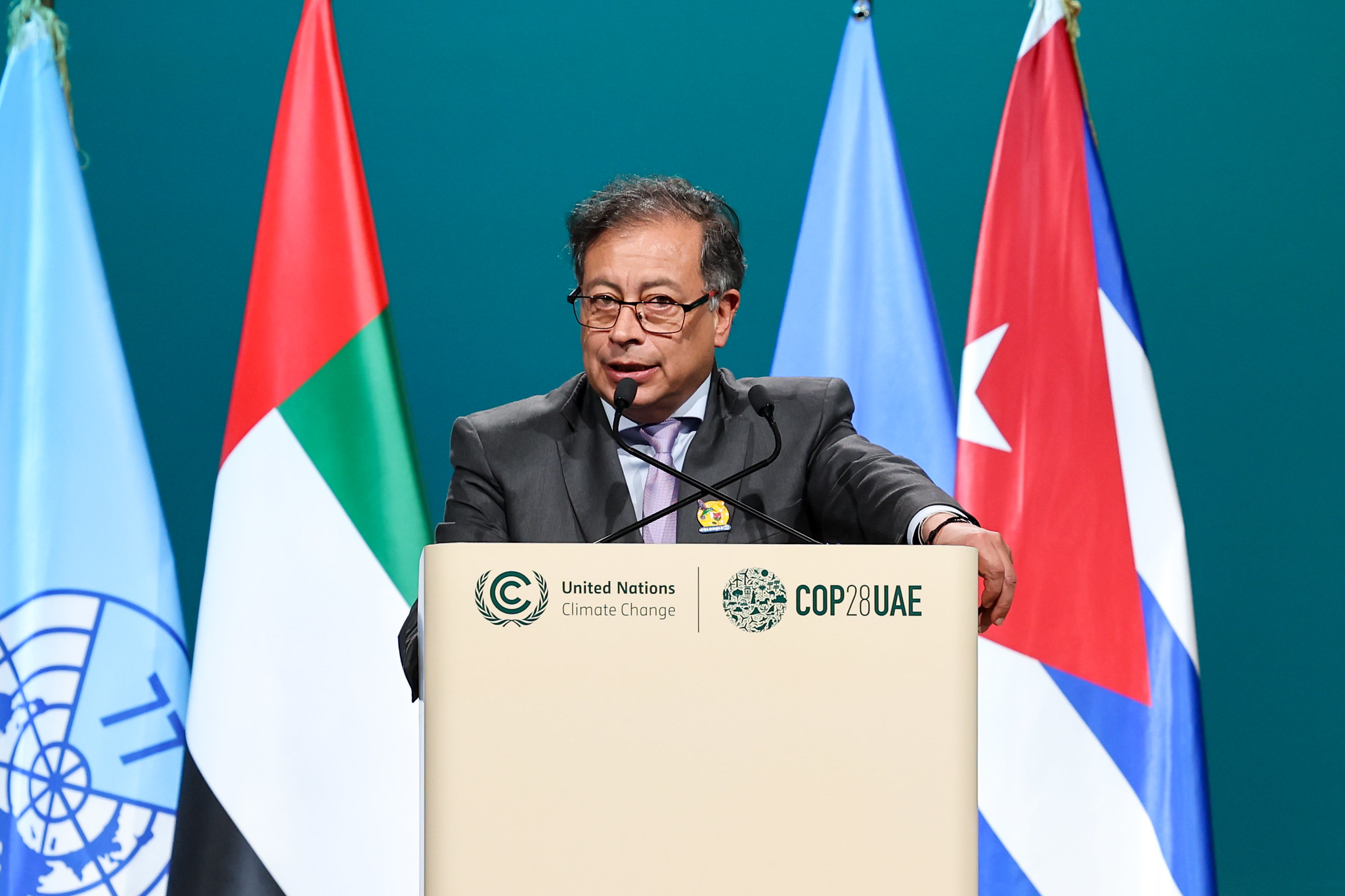Written by: Kimberly White
Colombia has joined the call for a global phase-out of fossil fuels.
During climate negotiations in Dubai, Colombian President Gustavo Petro announced that the oil-dependent nation had joined an alliance of nations advocating for a Fossil Fuel Non-Proliferation Treaty to avoid the “omnicide” of our planet.
Colombia is the first Latin American country to formally join the bloc of nations and the largest oil producer of coal and gas to call for a new framework to manage a global phase-out from fossil fuels and a just transition to renewable energy.
The alliance of nation-states reaffirmed their intention to secure a negotiating mandate for a new treaty centered on addressing the climate crisis and accelerating a just transition to clean energy for all.
Joined by fellow world leaders and Fossil Fuel Treaty supporters, the Colombian President noted that the world is at a critical point in time where we can continue on the path to self-destruction through continued fossil fuel expansion or choose the “intelligent and rational transition toward a way of life without oil and coal.”
“It is a paradox that, at this table, together with populations that could disappear, there is a country like us, which also depends on oil, and which is committed to endorsing a treaty that implies zero new exploration projects in the world. My own society would say, ‘How would the President produce such economic suicide?’, given that we depend on oil and coal. But this is not economic suicide,” said President Gustavo Petro. “We are talking here about an ‘omnicide’, the risk of extinction of life on the planet. Here we are avoiding ‘omnicide’ on planet Earth. There is no other way, the rest are illusions.”
World negotiations at COP28 notably struggled to unite around a plan to phase-out fossil fuels, with certain stakeholders taking issue with the phrase “phase-out.” Despite the scientific consensus in favor of phasing out fossil fuels, the lead cause of the climate emergency, some countries instead argued for a “phase-down,” weaker language that denotes fossil fuel burning must decline but fails to specify by how much or when.
Similar rhetoric from the COP28 President ignited a firestorm of condemnation from climate scientists, environmental organizations, and other world leaders when Sultan Al Jaber falsely claimed there was “no science out there that says the phase-out of fossil fuel is what is going to achieve 1.5C” and that committing to phasing out fossil fuels would take the world backward, or “back into caves.” Al Jaber later doubled down on his comments during an emergency press conference.
Al Jaber’s role as COP28 President had been a source of concern. An oil and gas executive leading the world’s premiere conference on ambitious climate action obviously cast a shadow of doubt on COP proceedings. Ultimately, nations settled on an agreement to transition away from fossil fuels in energy systems “in a just, orderly and equitable manner … so as to achieve net zero by 2050 in keeping with the science.”
Colombia’s bold endorsement of a fossil fuel treaty sends a clear message: it is time to end the fossil fuel era.
“There is a very powerful economic power around oil, coal, and gas. And they act to prevent changes, to maintain, in a suicidal way, their possibilities for more years of profit in the short term,” added Petro. “Today we face an immense confrontation between fossil capital and human life. And we must choose a side. Any human being knows that we must choose life. I have no doubt which position to take: between fossil capital and life, we choose the side of life.”
The move builds on the Colombian President’s campaign promises. During his 2022 presidential run, Petro and his running mate, Goldman Environmental Prize-winning environmental activist Francia Márquez, pledged to reduce their nation’s dependence on oil and coal, halt new permits for oil exploration, and scale up renewable energy infrastructure throughout the Latin American country.
Colombia produces roughly one percent of the world’s coal, oil, and gas. Oil and coal exports account for the nation’s largest source of foreign currency.
“The science of climate change is unequivocal, and Colombia’s decision to lead the call for a Fossil Fuel Non-Proliferation Treaty is a response to the multiple warnings of the IPCC and the entire scientific community,” said Laura Gómez, climate change expert and author of the IPCC AR6 report. “Our research has made it clear that to avoid even more catastrophic human and climate impacts, we cannot afford to continue extracting more oil, coal, and gas.”
“Colombia, in advocating for this treaty, demonstrates a deep understanding of the urgency and necessity of aligning our policies with the scientific evidence,” explains Gómez. “The planet and humanity depend on decisive and collective action to stop the proliferation of fossil fuels, and Colombia is taking a crucial step in the right direction, which other countries need to follow.”
Header Image Credit: Mahmoud Khaled, UNFCCC/Flickr (CC BY-NC-SA 2.0)







